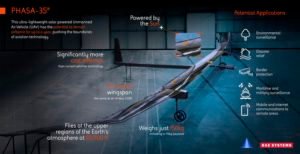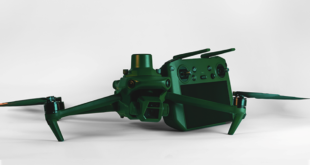Source: BAE
A drone with a 150-foot wingspan just completed a 72-hour endurance trial near the English town of Farnborough.
A solar-electric, fixed-wing drone, the PHASA-35 completed trials earlier this month in a simulated environment designed to model harsh stratospheric conditions.
A collaborative effort by BAE Systems, Prismatic and the UK’s Defence Science and Technology Laboratory (Dstl), the trials attempted to demonstrate PHASA-35’s effectiveness as “a fully integrated system together with Dstl’s communications sensor payload; a radio frequency sensing software-defined radio that provides a real-time and secure data link,” officials say.
Classified as a high-altitude, long-endurance, drone (HALE), PHASA-35 completed its maiden voyage in February, less than two years from initial design. A BAE spokesperson said the drone has “the potential to maintain flight for up to a year at a time, in the stratosphere, providing military and commercial customers with capabilities not currently available from existing air and space programs.”
Future applications could include the delivery of communications networks, including 5G, as well as support to disaster relief and border protection. The drone’s payload capacity can be adapted to meet the needs of the user to carry sensors such as cameras, thermal imaging and communications equipment.
“PHASA-35 is a great example of how we’ve brought together the best in British expertise and partnered to drive technological innovation and deliver critical capability,” BAE Systems Air CEO Ian Muldowney said.
“This latest success, only eight months after PHASA-35’s maiden flight, further demonstrates how UK industry and our partners are accelerating pace to deliver the UK’s vision for innovation, a Future Combat Air System and information advantage.”
The trials also enabled the flight team to practice operations needed in flight, including transition from daytime, when the drone is powered by the solar array, to night-time, when the aircraft’s batteries are discharged.
“BAE Systems and Prismatic have put the integration and operation of the user payload at the heart of the PHASA-35 design and it has been very satisfying to work with the team in so clearly showing the benefits of this approach,” Dstl payload advisor Paul Mather said. “Dstl has a proud tradition of rapid proving of new technologies which provide military and security advantage, which this latest success reinforces.”
Jason is a longstanding contributor to DroneLife with an avid interest in all things tech. He focuses on anti-drone technologies and the public safety sector; police, fire, and search and rescue.
Beginning his career as a journalist in 1996, Jason has since written and edited thousands of engaging news articles, blog posts, press releases and online content.
Email Jason
TWITTER:@JasonPReagan
Subscribe to DroneLife here.
https://dronelife.com/2020/10/21/british-team-completes-72-hour-drone-flight-test/
 Unmanned Aerial Vehicle The latest drone news
Unmanned Aerial Vehicle The latest drone news



